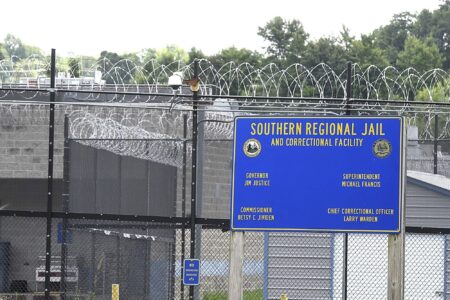
FILE – The Southern Regional Jail in Beaver, W.Va., is seen in this undated photo. Five former correctional officers in West Virginia were indicted by a federal grand jury Thursday, Nov. 30, 2023, in connection with the 2022 death of an incarcerated person who was beaten while handcuffed and restrained in an interview room and later a prison cell at the jail. (Rick Barbero/The Register-Herald via AP, File)
CHARLESTON — Attorneys for Gov. Jim Justice, trying to make the case why he should be dismissed from a federal class action lawsuit over conditions in West Virginia’s jails and prisons, argued last week that inmates are trying to put the federal courts in charge of the state’s correctional system.
In a reply filed Dec. 1 supporting a motion to dismiss Justice from a class action lawsuit filed in August by attorneys representing inmates across the entire spectrum of the state’s correctional system, the governor argues the lawsuit is an attempt to strip oversight by the state of its jails, prisons and juvenile centers.
“Plaintiffs are attempting to oversee both the administration and public funding of all state correctional institutions in West Virginia by employing the power of the federal court as the ultimate superintendent,” wrote Michael Hissam, an attorney representing Justice. “For many reasons, the claim alleged against the Governor in his official capacity is defective as a matter of law and must be dismissed.”
The class action lawsuit filed Aug. 8 in the U.S. District Court for the Southern District of West Virginia against Justice and Department of Homeland Security Cabinet Secretary Mark Sorsaia accuses the state of understaffing, overcrowding and delays of deferred maintenance for facilities.
The state is accused of violating the Eighth Amendment constitutional rights of inmates against cruel and unusual punishment.
The inmates are seeking a ruling in their favor and an order to require the state to spend no less than $330 million on staffing and maintenance for the state’s entire system of 11 prisons, 10 regional jails, 10 juvenile centers and three work-release sites with available funds or by submitting appropriations bills between now and the next legislative session beginning in January.
Both Sorsaia, whose department oversees the Division of Corrections and Rehabilitation, and Justice filed motions in November seeking dismissal of the federal lawsuit. In his follow-up reply on behalf of Justice, Hissam said the legal remedy being sought by the inmates violates the state’s sovereign immunity and separation of powers between the state and federal government.
Hissam argued any federal order either requiring Justice to grant reprieves or paroles to alleviate jail and prison overcrowding would be impossible because federal courts have no authority over what he called “discretionary actions” by state officials.
“…The prospect of relying on a state governor’s discretionary pardon or commutation power to exercise the federal judicial power over the state to ease overcrowding raises serious federalism and separation of powers concerns, as well as the question of whether the scope of the federal judicial power even includes the authority to order a State’s governor to issue mass pardons or commutations,” Hissam wrote.
Hissam also argued that while the governor has the authority to set revenue estimates upon which state budgets are based, then present a proposed budget to the Legislature, Justice’s does not have unilateral power over what that budget looks like once it is passed by the Legislature. While the governor can propose how funds are appropriated, it is the Legislature that has power of the purse.
“Plaintiffs do not dispute that the governor cannot appropriate funds. Nor do they appear to defend their request that this court order the governor to appropriate funds himself. Rather, plaintiffs only rely on the governor’s power to propose the appropriation of funds,” Hissam wrote. “But the act of proposing the spending of funds to the Legislature (all that the governor can do in this regard) does not remedy the wrongs as alleged by Plaintiffs.”
The case was filed on behalf of Thomas Sheppheard, an inmate at Mt. Olive Correctional Complex in Fayette County; Tyler Randall, an inmate at the Southwestern Regional Jail in Logan County; and an unnamed juvenile at the Donald R. Kuhn Juvenile Center in Boone County. The inmates are presented by several law firms led by New Taylor and Associates.
This post was originally published on this site be sure to check out more of their content.








